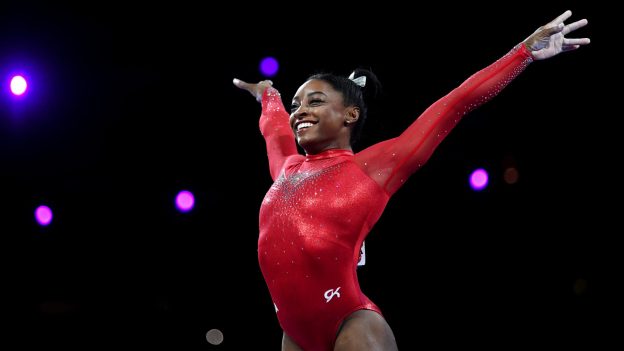Simone Biles has accomplished and survived so much in her 24 years. She is the first US female gymnast to win four gold medals in a single Olympics. She was placed in the foster care system as a child before being adopted by her grandparents. She is a survivor of sexual abuse. In addition to this, as a black woman, she has also had to deal with the racism that pervades the sport of gymnastics. Over the past few days, I have thought so much about how happy I am that today’s young people and my future children have Simone Biles as a role model. I have also worried that we will not utilize this moment as the learning experience it should be.
We are aware of many of the details of Biles’ struggles because of her fame. It is also easy for us to lend our support with the click of a button on Facebook, or a heart emoji on Instagram. Offering support to Biles may also be more comfortable to us because of all of her triumphs. When speaking about mental and physical health, our society often perpetuates what is called the “myth of overcoming.” Michelle Lelwica explains in her book, Shameful Bodies: Religion and the Culture of Physical Improvement, that when people with mental or physical struggles are visible in popular culture it is because they “overcame” them in some way: the person who excels at sports, the person who writes books, the person who defies the odds. Of course, I am in no way saying we should not be celebrating such scenarios, but we also need to remember the struggles of “the ordinary people,” the children growing up in foster care who are not winning Olympic medals, the people struggling with mental illness who are not top athletes or scholars, the sexual assault survivors who have not written books or gone on television shows.
To really honor Simone Biles’ bravery, we have to act, not just offer sympathy on Facebook. That action has to start in our own communities. Athletes not competing at high levels (anyone who moves their body intentionally for the purpose of enjoyment or competition is an athlete) should also be encouraged to put their mental and physical health first, and the care of doctors, dieticians, and physical therapists should be available to them. We must work to de-stigmatize the decision of students to stay back a year, or to take a semester off to protect themselves. As Biles posted on her Instagram recently, “the outpouring of love and support I’ve received has made me realize I’m more than my accomplishment and my gymnastics which I’ve never truly believed before.” It is heartbreaking she never saw this before. Ideally, this is something she should have been told before she ever won her first medal. It is even more heartbreaking that some people will never make such a realization, pushing themselves to the point of exhaustion, injury, or even death; or feeling worthless when pushing through pain is no longer possible (the body is not infinite).
One thing I have learned as a college professor is that my students all have stories, and those stories are not always neatly visible on their faces, on their bodies, or in their writing assignments. Students who “look healthy” may be struggling with a life-threatening condition. Students you see in class smiling everyday may be working to heal from the trauma of sexual assault. They may be the primary caregiver for a sick parent. While I am aware that racism, sexism, ableism, and homophobia exist, as a white cisgender woman, it can be all too easy to forget just how much these impact individual people in their daily lives: the fear and terror the young black men feels after the murder of George Floyd, the horror of the young Muslim woman pressured by friends not to wear a veil on the subway to protect her safety, the transgender student with nowhere to go for holidays because their family home is not safe space.
I have often been shocked at some of the stories of pain that have been disclosed to me in my short time as an educator, and I always feel blessed when a student trusts me enough to share. I also know that there are stories that I do not know, and stories that perhaps no one will ever know.
Some students get straight As while in treatment for mental and physical illness, others cannot. Some people may experience horrible racism or sexism and “stick it out,” others may leave their particular team, or school, or workplace because it is a toxic environment for them. Some people may become champion athletes after an illness or injury, others will not. The latter are not “weaker,” nor are the former “stronger.” There are a variety of factors that contribute to how a person handles trauma, including but socioeconomic status, race, gender, sexual orientation, level of familial support, etc. What we need to work on as a society is creating a world where there are not barriers limiting a person’s ability to make the choice that protects their well-being (and also knowing that choice may not be the same for all people).
So, I guess with all of this, my point really is simple. You do not know a person’s full story. Be kind. Do not judge. And every person, regardless of their level of fame or talent, is more than their accomplishments.
